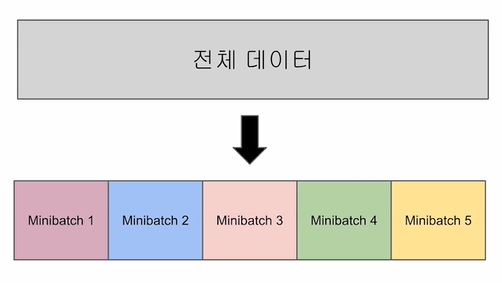Minibatch Gradient Descent
엄청난 양의 데이터를 한번에 학습시킬 수 없다!(속도, 하드웨어적 문제)
-> 전체 데이터를 균일하게 나눠서 학습

Minibatch Gradient Descent: Effects
- 모든 데이터를 사용하지 않아 업데이트가 좀 더 빠르다
- 전체 데이터를 쓰지 않아서 잘못된 방향으로 업데이트 할 수도 있다.
Pytorch Dataset
from torch.utils.data import Dataset
class CustomDataset(Dataset):
def __init__(self):
self.x_data = [[73, 80, 75],
[93, 88, 93],
[89, 91, 90],
[96, 98, 100],
[73, 66, 70]]
self.y_data = [[152], [185], [180], [196], [142]]
def __len__(self):
return len(self.x_data)
def __getitem__(self, idx):
x = torch.FloatTensor(self.x_data[idx])
y = torch.FloatTensor(self.y_data[idx])
return x,yPytorch DataLoader
from torch.utils.data import Dataloader
dataloader = DataLoader(
dataset,
# 통상적으로 2의 제곱으로 설정
batch_size = 2,
# Epoch 마다 데이터셋을 섞어서 데이터가 학습되는 순서를 바꾼다
shuffle = True,
)Full code with Dataset and DataLoader
x_train = torch.FloatTensor(x_data)
y_train = torch.FloatTensor(y_data)
# 모델 초기화
W = torch.zeros((3, 1), requires_grad=True)
b = torch.zeros(1, requires_grad=True)
# optimizer 설정
optimizer = optim.SGD([W, b], lr=1e-5)
nb_epochs = 20
for epoch in range(nb_epochs + 1):
for batch_idx, sample in enumerate(dataloader):
x_train, y_train = samples
# H(x) 계산
hypothesis = x_train.matmul(W) + b # or .mm or @
# cost 계산
cost = torch.mean((hypothesis - y_train) ** 2)
# cost로 H(x) 개선
optimizer.zero_grad()
cost.backward()
optimizer.step()
# 100번마다 로그 출력
print('Epoch {:4d}/{} Cost: {:.6f}'.format(
epoch, nb_epochs, cost.item()
))